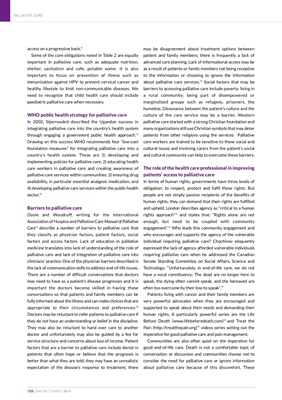
PALLIATIVE CARE
CANCER CONTROL 2014 121
societal constraints make it important for health care
professionals who work with patients with advanced life
threatening or life-limiting illnesses to take on the role of
advocating for palliative care and to encourage patients and
family members to speak out and let their plight be known.
To speak particularly about oncologists, oncology nurses
and oncology social workers and palliative care workers
engaged in the care of cancer patients, there are a number of
important ways we can improve care of cancer patients as
their illness progresses. We should ensure our own
knowledge and skills of clinical oncology and of palliative care
are well developed and up-to-date and recognize that
palliative care is not only for the end of a life. We should
incorporate palliative care into everyday practice, while
recognizing that difficult symptoms or psychosocial problems
may warrant specialized palliative care. We should explore
our own comfort in working with patients whose disease is no
longer curable. We should ask about distressing symptoms,
manage them effectively and review the response to
symptom management. We should develop the skills and find
the courage to have difficult conversations about
withdrawing treatment that is no longer able to cure or
contain the cancer. We should discuss options for care and
explore patients' fears so that we can either reassure them or
explain how we will deal with problems that might develop. It
would be of benefit to have a palliative care nurse or
physician as part of the oncology unit team.
Conclusion
In summary, we should offer individualized care appropriate
to patient preference and stage of illness that includes quality
palliative care.
We should also be the voice for the voiceless and advocate
for palliative care policies in our countries, for clinical
guidelines and protocols guiding palliative care practice; for
palliative care training in our nursing and medical schools; for
access to essential palliative care medicines in our own
countries, and in countries worldwide, in order to relieve the
suffering of patients in pain; and we should advocate for
appropriate palliative care services in health care facilities,
care homes and for home palliative care services so that
patients and families can access the care they need. l
Dr Liz Gwyther has postgraduate qualifications in family practice
and palliative medicine. She is CEO of Hospice Palliative Care
Association of South Africa (HPCA); a Trustee of the Worldwide
Hospice Palliative Care Alliance (WPCA); and a director of the
following organizations - African Palliative Care Association,
ehospice, Networking AIDS Community of South Africa
(NACOSA), and Pain Society of South Africa.
She is a senior lecturer at the University of Cape Town where
she heads the Palliative Care team within the School of Public
Health and Family Medicine. She is also the convener for the
postgraduate programmes in palliative medicine. Her special
interests are women's health and palliative care and human
rights in health care. In 2007, she was awarded the SA Medical
Association's Gender Award for Human Rights in Health and the
SA Institute of Health Managers Leadership in Health Systems
award. She is a member of the editorial board of the Journal of
Pain & Symptom Management published in the USA.
References
1. Mapping levels of palliative care development: a global update 2011
http://www.thewpca.org/resources/ accessed 3rd Sept 2013
2. Brennan F. Palliative care as an international human right. J Pain Symptom Manage
2007;33(5):494-499.
3. Radbruch L, De Lima L, Lohmann D, Gwyther E, Payne S. The Prague Charter: Urging
governments to relieve suffering and ensure the right to palliative care (2013)
Palliative Medicine;27(2): 101-102
4. http://www.ohchr.org/en/hrbodies/pages/treatybodies.aspx# accessed 8th
September 2013
5. http://www.ohchr.org/en/issues/pages/whatarehumanrights.aspx accessed 3rd
September, 2013
6. http://www.ohchr.org/en/udhr/documents/udhr_translations/eng.pdf accessed
3rd September, 2013
7. Committee on Economic, Social and Cultural Rights. General comment no.14. Twentysecond session. Geneva,
April 25 May 12, 2000.
8. Hunt P. UN Human Rights Council. Special rapporteur on the right of everyone to the
highest attainable standard of physical and mental health. 2009.
9. Nowak M and Hunt P. Special Rapporteurs on the question of Torture and the Right of
everyone to the highest attainable standard of physical and mental health. Letter to
Mr D. Best, Vice-Chairperson of the Commission on Narcotic Drugs, December 10
2008.
10.http://www.ohchr.org/documents/hrbodies/hrcouncil/regularsession/
Session22/a.hrc.22.53_english.pdf accessed 1 September, 2013
11.stjernswärd, J. Uganda: Initiating a Government Public Health Approach to Pain Relief
and Palliative Care. J Pain Symptom Manage, 2002; 24 (2):257-264.
12.stjernsward J, Foley KM, Ferris FD. The public health strategy for palliative care. J Pain
Symptom Manage 2007;33(5):486-493.
13.http://hospicecare.com/about-iahpc/publications/manuals-guidelines-books/manualof-palliative-care/
accessed 1st September, 2013
14.fourie I. Understanding information behaviour in palliative care: arguing for exploring
a diversity and multiplicity of overlapping contexts. Information Research, December,
2012; vol. 17 no. 4 Available at http://informationr.net/ir/17-4/paper540.html
15.london L. What is a human rights-based approach to health and does it matter? Health
and Human Rights 2008 10 (1) 65-80
16.london L. Making human rights work for the public's health: equity and access in
Global Forum Update on Research for Health eds Cuervo LG et al Pro-Book Publishing
Ltd. 2007 54-58
17.chochinov H. Address to Standing Committee on Social Affairs, Science and
Technology. Quality end-of-life care: The rights of every Canadian. Final report of the
subcommittee to update of life and death. Ottawa, ON: Senate of Canada, 2000.
18.http://www.lifebeforedeath.com/movie/short-films.shtml (accessed 20 Nov 2013)
19.http://treatthepain.org/ accessed 20 Nov 2013